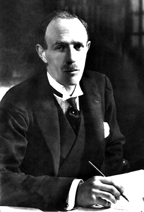Irwin, Lord
Irwin, Lord (1881-1959) Governor General and Viceroy of India from 3 April 1926 to 18 April 1931. Son of the second Viscount Halifax, Lord Edward Frederick Wood Irwin was educated at Eton and served as a Member of Parliament from 1910 to 1925. During the period he held several ministerial posts on the cabinet. In 1926 he was appointed the Governor General and Viceroy of India, a post he held till 1931. Irwin's viceroyalty was a period of great political turmoil.

The simon commission report, nehru report, all parties conference, jinnah’s 14 points, civil disobedience movement, Round Table Conferences, and some other problems had made his regime extremely stressful. The series of crises, in fact, originated mainly from the exclusion of Indian leaders from the Simon Commission. In facing one political crisis new crises emerged. The issue of Dominion Status as understood by the Indian leaders and interpreted by the India Council was another thorny problem. indian national congress under the leadership of Mahatma Gandhi started the Civil Disobedience Movement in April 1930.
The Muslim League leader Mohammad Ali Jinnah had been threatening Muslim disobedience movement unless the rights of the Muslim community were justly reflected in the coming constitution.
Irwin tried to meet these political problems with great patience and fortitude. But the given situation was so enigmatic and complex that traditional diplomacy and artfulness appeared to be ineffective in the midst of unprecedented political uproar. The Hindus, the Muslims, the Anglo-Indian community, the extremists, the Native States, all had their claims to be settled before the enactment of the India Act. The crisis was further compounded by the fact that each of these communities was led by parties holding diametrically opposite views about the inter community status to be recognized in the future constitution. Congress, the most organized party, represented many interests who wanted to be heard by the Viceroy, but it practically impossible to satisfy all the Congress factions.
At one stage, Irwin had all the leaders of the Congress behind the bar as a strategy and then at one stage had opened negotiations with Gandhi alone. The strategy worked. An agreement called Gandhi Irwin Pact was reached (on 5 March 1931). The salient features of the Pact were:
The Congress would participate in the Round Table Conference; The Congress would withdraw the Civil Disobedience Movement;
The Government would withdraw all ordinances and prosecutions against the Congress leaders and activists;
The Government would release all political prisoners detained in course of the Civil Disobedience Movement;
It was also agreed under the Pact that Gandhi would join the Second Round Table Conference as the sole representative of the Congress.
The Congress, it may be mentioned, boycotted the first Round Table Conference. A month following the Gandhi-Irwin Pact, Lord Irwin retired and left India to join his new position as British ambassador to the USA.
'Irwin had high esteem for Mahatma Gandhi and he ventilated his deep regard for Gandhi several times at formal occasions before his departure. Irwin essentially loved academics, rather than politics. He turned down a proposal for the position of Foreign Secretary and instead became a Master of the Middleton Hunt in 1932. Irwin was later persuaded to become the Secretary of State for Foreign Affairs. He held the office from 1938 to 1940. In 1934, he inherited the title Viscount Halifax from his father. Irwin was the leader of the House of Lords from 1935 to1938. He became the Chancellor of Oxford University in 1933 and held the position until his death on 23 December 1959. [Sirajul Islam]
